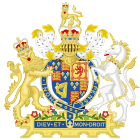Tenures Abolition Act 1660 facts for kids
| Act of Parliament | |

|
|
| Long title | An Act takeing away the Court of Wards and Liveries and Tenures in Capite and Knights Service and Purveyance, and for setling a Revenue upon His Majesty in Lieu thereof. |
|---|---|
| Citation | 12 Cha. 2. c. 24 |
| Dates | |
| Royal assent | 24 December 1660 |
| Commencement | 25 April 1660 |
| Other legislation | |
| Repeals/revokes |
|
|
Status: Amended
|
|
| Text of statute as originally enacted | |
| Revised text of statute as amended | |
The Tenures Abolition Act 1660 (also known as the Statute of Tenures) was an important Act in England. It changed how land was held under the old feudal system. The long name of the Act was An Act takeing away the Court of Wards and Liveries, and Tenures in Capite, and by Knights-service, and Purveyance, and for settling a Revenue upon his Majesty in Lieu thereof.
This law was passed in 1660 by the Convention Parliament. This happened right after the English Restoration, when the monarchy was brought back to England.
What the Act Did
The Act changed many types of service that landholders owed to the King. Before, people who held land had to provide military or religious service. This Act replaced those duties with something called socage. Socage meant they paid rent instead of service.
A New Way to Pay the King
The King was given a fixed payment of £100,000 each year. This money came from a new tax on alcohol. This tax was called an excise duty. This change meant the King got a steady income. It also meant he didn't have to rely on old feudal duties.
The Act did not change all landholding types. Some, like Frankalmoin (religious service) and copyhold (tenant farming), were not included. Some parts of grand serjeanty (special services to the King) were also left out.
Ending Feudalism
This law helped to reduce feudalism in England. Feudalism was a system where land was exchanged for loyalty and service. The Act took away the King's right to demand that certain people join the Army.
It made landholding more standard for the wealthy. Before, some land was held by a knight's fee, which meant military service. The Act changed most of these into socage. This meant less or no demands from the King.
New Taxes and Courts
While socage usually meant paying rent, "free and common socage" often meant no rent to the King. Instead, the Act created new offices and courts. These were set up to collect the new excise tax.
This tax was put on the general public. It provided income for the King, his ministers, and government workers. This replaced the old feudal payments from the wealthy landowners.
Abolishing the Court of Wards
Section 3 of the Act removed two older laws from the time of Henry VIII. This also got rid of the Court of Wards and Liveries. This court was created in 1540. Its job was to collect money under the old feudal system.
Tax on Drinks
Section 14 of the Act was the first to put an excise duty on tea. It also taxed coffee, sherbet, and chocolate. This tax was on the finished drink, not the raw ingredients. It was treated like taxes on beer or spirits.
Guardians for Children
The Act also allowed fathers to name a guardian for their children in their will. This guardian's rights were stronger than the children's mother's rights.
Still in Force Today
Part of the Act is still in force in the United Kingdom today. Only section 4 remains active. It states:
And that all tenures hereafter to be created by the Kings Majestie his Heires or Successors upon any gifts or grants of any Mannours Lands Tenements or Hereditaments of any Estate of Inheritance at the common Law shall be in free and common Soccage, and shall be adjudged to be in free and common Soccage onely, and not by Knight service or in Capite, and shall be discharged of all Wardship value and forfeiture of Marriage Livery Primer-Seizin Ouster le main Aide pur faier fitz Chivalier & pur file marrier, Any Law Statute or reservation to the contrary thereof any wise notwithstanding.
This means that any new land grants from the King must be in "free and common socage." They cannot be based on old feudal duties like knight service. This ensures that the old feudal system of landholding cannot return.
 | May Edward Chinn |
 | Rebecca Cole |
 | Alexa Canady |
 | Dorothy Lavinia Brown |

